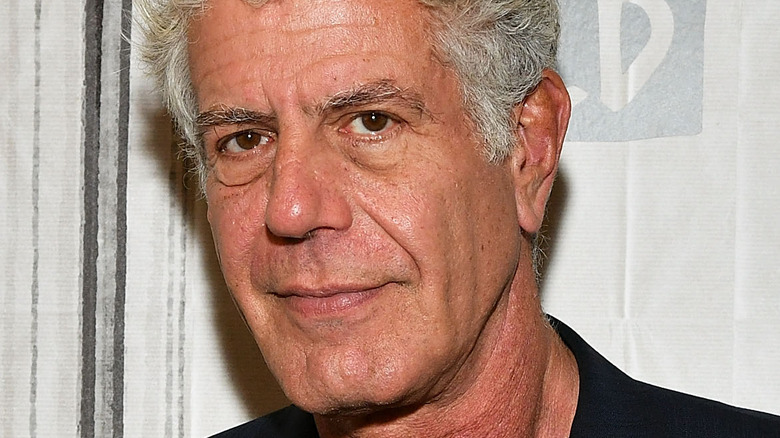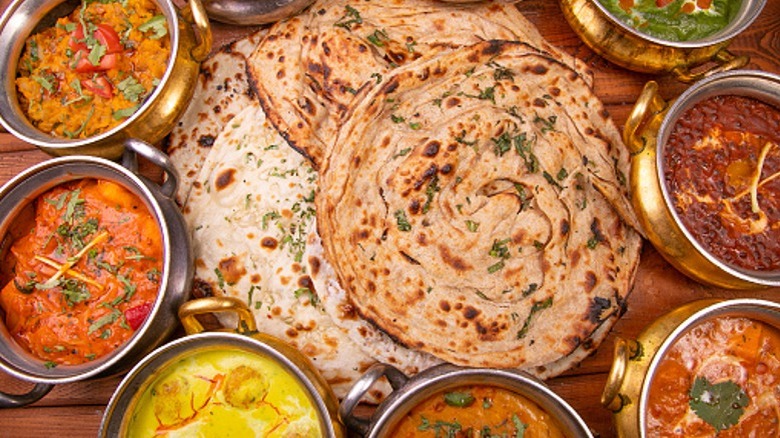The Only Place On Earth Where Anthony Bourdain Actually Loved Vegetarian Food
To say that Anthony Bourdain wasn't a fan of vegetarian dining would be a gross understatement. The chef-slash-writer had no interest in trying the Impossible Burger when it hit the market in 2016. Years earlier, in his 2000 magnum opus "Kitchen Confidential," Bourdain decried, "To me, life without veal stock, pork fat, sausage, organ meat, demi-glace, or even stinky cheese is a life not worth living. Vegetarians are the enemy of everything good and decent in the human spirit, an affront to all I stand for, the pure enjoyment of food." But Bourdain was singing a different tune when he visited India.
The host largely got his mind changed during the Punjab episode of "Parts Unknown." In a post-interview with CNN, Anderson Cooper points out how much Bourdain seemed to enjoy vegetarian food in Punjab, which seemingly contradicts his earlier outspoken vendetta. But Bourdain wasn't shy about admitting his change of heart: "India, and Punjab, in particular — that's a place where I could happily eat vegetarian for quite some time without really noticing it and enjoy it. The food is so proudly prepared; the textures are very colorful and spicy."
So what made Indian vegetarian dishes the exception for Bourdain? "In the Punjab, meat or no meat, you're almost guaranteed a free-for-all of intense colors, flavors, and spices," he raved. Instead of relying on meat to carry the meal, Indian dishes commonly showcase flavorful spices like cumin, cardamom, coriander, tamarind, and garam masala — and that's just the beginning.
Flipping the script in Punjab
As Anthony Bourdain mentioned in his CNN interview, "Indian vegetarian culture is very old and very rich." Indeed, Hinduism is the dominant religion in India, accounting for 79.8% of the country's population, per a 2021 study by Pew Research Center. The belief system champions vegetarianism, and Hindu or not, 81% of Indian adults restrict meat in their daily diets — though notably, as anthropologist Balmurli Natrajan and economist Suraj Jacob point out, factors like economic class, social pressures, and rampant stereotypes heavily influence the real-versus-reported accuracy of vegetarianism across the country (via the BBC). But largely, meat is not automatically assumed in Punjabi culinary stylings.
For some popular dishes like chicken tikka masala and mughlai chicken, meat is explicitly listed in the name. Others, like biryani and curry, are interchangeably made with or without meat. Palak paneer and aloo gobi are veggie-forward dishes with huge flavor and dimensional texture. Chickpeas, mung beans, naan roti, yogurt, basmati rice, and coconut milk are commonplace star ingredients — no meat necessary.
When diehard fans think of the foods Bourdain loved, they'll probably think of oysters or foie gras long before considering baingan bharta. As Bourdain himself teased in a promo for the episode, "See Tony eat vegetables — and like it." But humanity contains multitudes, and few individuals contained as many multitudes as Bourdain. (If a trip to Punjab is a bit of a reach, hit up a local Indian restaurant and find out what the hype is about for yourself.)

